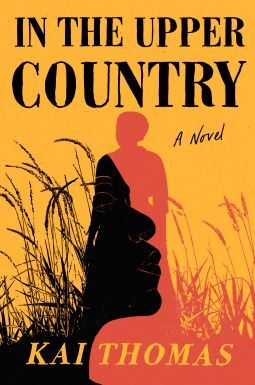Trudy J. Morgan-Cole's Blog, page 7
February 27, 2025
The Phoenix Crown, by Kate Quinn and Janie Chang
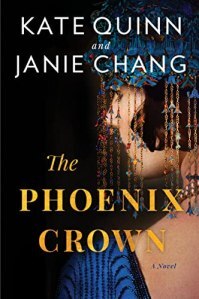
This is the second novel I’ve read set against the backdrop of the San Francisco Earthquake of 1906 (the first was The Nature of Fragile Things, by Susan Meissner). This one, however, has a lot more going on in addition to (and after!) the earthquake.
It follows four women: opera singer Gemma, seamstress Suling, artist Nellie, and botanist Alice Eastwood (the one real woman in this quartet) whose lives intersect in various ways in the days leading up to the earthquake. Their paths cross around their interactions with one man, wealthy patron of the arts Henry Thornton, who decides to make Gemma as famous as he believes she deserves to be. Along the way we get a lot of opera, botany, life in San Francisco’s Chinatown, and a few real-life characters like Enrico Caruso and a cameo appearance by actor John Barrymore. While the drama of the story felt a little contrived at times, the glimpse into all these different worlds at this point in time was very interesting.
February 26, 2025
The Life Cycle of the Common Octopus, by Emma Knight
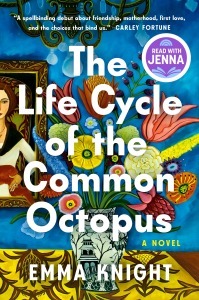
First of all: this book is not about octopuses. There is zero octopus content in this novel; you are not going to meet a sentient, wise octopus character like in Remarkably Bright Creatures. The octopus is a metaphor, and one that is mentioned fairly let in the novel, though it’s very apt for at least one of the novel’s major themes. Given the sudden surge in octopus popularity in fiction and popular culture at the moment, it’s tempting to suspect that someone at the publishing house leapt upon that metaphor as a great and very saleable title idea, but this novel is strong enough that it doesn’t need to reach out a tentacle to lure in octo-curious readers only to disappoint them: it should stand on its own merits as a very human coming-of-age story that explores themes of family and identity.
The man character, Pen, is a Canadian girl who, along with her best friend Alice, leaves Toronto to attend the University of Edinburgh (as the author herself did) in 2006. Both girls are inspired to leave the country for university by a desire for adventure away from home, but Pen has another motive: there’s a famous Scottish author (who is also a lord, and lives in a vast manor house) who was her father’s best friend when he, too, lived in Britain in his youth. Her father has been cagey about this friend and why they’re more or less estranged now, and Pen, raised amid the wreckage of her parents’ unhappy marriage and eventual divorce, believes that if she can meet this old friend of her father’s, she can perhaps uncover some secret that might help her understand her family better.
Well, she does uncover secrets — while at the same time meeting new people, falling in love, testing the strength of friendships, making dumb mistakes, re-inventing herself, and examining her family in a new light — in other words, doing all the things you’re supposed to do in the first year of university, especially if you’ve moved far from home to go there. I thoroughly enjoyed these characters and this journey through Pen’s first year in Edinburgh, with all the discoveries, both external and internal, that she makes. I also really enjoyed the time-setting of 2006 — that era of non-smart phones, character-limited texting, and instant-messaging chats on a desktop computer: when instant communication was possible but so much less immediate and pervasive than it is today; perhaps the very last moment when it was possible for people to be truly unplugged. It was nice revisiting that moment, as well as that time in life (much earlier than 2006 for me, and in a very different setting, but with many of the same emotions) when you’re 18, far from home, making new friends and trying to figure out who you were. I loved everything about this book.
The God of the Woods, by Liz Moore
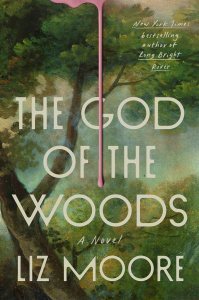
This is slightly further along the spectrum towards thriller/suspense than I usually read, but Liz Moore is a writer whose work I’ve enjoyed before and who I feel I can trust to make any novel a rich study of character rather than just an exercise in building suspense. This was certainly the case with The God of the Woods, which I absolutely loved and devoured in a day or two.
The novel is set in the 1970s, at a summer camp in upstate New York. A young camper, the daughter of the wealthy family who owns the camp property, goes missing in the night. To compound the mystery, this same family’s only other child, a small boy, went missing in the woods near the family home several years earlier and was never found. A second disappearance from the same family on the same property feels too sinister to be coincidence.
Moore has a large cast of characters in this novel — the counsellor from whose cabin the girl disappeared, another camper who is a close friend of the missing girl, a young female police officer investigating the disappearance, and, isolated in her huge house on the hill, the girl’s mother, who has never recovered from the loss of her son and is now confronted with this second loss.
Every one of the viewpoint characters felt compelling, rich, and fully developed to me, as did the tensions of class and gender that are woven all throughout this story. The resolution of the mystery (both mysteries, actually) was not something I could have predicted, but it felt appropriate and satisfying. I would definitely recommend this novel.
Legends and Lattes, by Travis Baldree
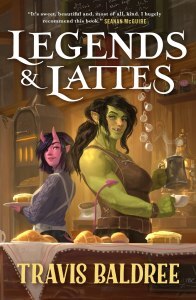
I’ve seen this book mentioned often online, and right after having DM’d my first D&D campaign seemed like a good time to pick it up. It’s advertised as “high fantasy with low stakes,” which is just lovely for when you want to read something set in a fantasy world where not everything has to be “IF WE DON’T DEFEAT THE GREAT EVIL ONE HE WILL ACTIVATE THE STONE OF BAD STUFF AND DESTROY THE ENTIRE WORLD OMG OMG!!!” Sometimes, you just want to read a book about an orc who opens a coffee shop and has to deal with small problems, like the local organized crime ring wanting a bribe, and opening a coffee shop in a town where no-one’s ever heard of coffee, and stuff like that. This is the book for when you want that. It’s very fun, it’s very D&D-coded, and this was an entirely light and non-challenging read that was still enjoyable.
Hello Beautiful, by Ann Napolitano
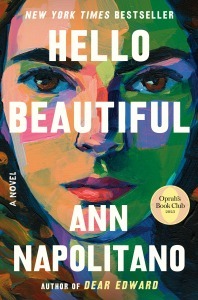
This was a quick read; a family saga about a close-knit family of four sisters growing up in an Italian-American neighbourhood in Chicago. It starts in the 1980s, although the characters and the story sometimes feel older, mired in an earlier world — more 1950s than 1980s. A young man with a troubled family background and one outstanding skill — he’s a college basketball player — begins dating and marries the eldest sister, and is briefly drawn into the warm embrace of this family. But all the sisterly closeness is shattered by a series of events that lead to isolation and estrangement — and finally, to a kind of reunion.
I read this book quickly and enjoyed it, but the characters never fully engaged me and I sometimes found them frustrating. I’m not sorry I read it and it’s certainly not a bad book, but it didn’t grab me the way some other recent reads have.
Soil: The Story of a Black Mother’s Garden, by Camille T. Dungy
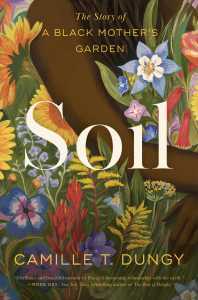
Soil was recommended to me by a friend when I posted about struggling with a second attempt to read Annie Dillard’s Pilgrim at Tinker Creek. This is a very different take on “women’s nature writing,” and one of the things Dungy addresses is a direct critique of Dillard and other nature writers who write about the natural world and its spiritual or philosophical lessons as though the writer existed in a vacuum with nature, no other inconvenient human beings to clutter up the landscape.
By contrast, Soil is a woman writing about nature while deeply embedded in family, community, and history. At the first and simplest layer, it’s about the garden that Dungy and her husband planted in their Colorado home, choosing plants native to the place where they lived, trying to cultivate something sustainable. It’s also about gardening, parenting, and existing in 2020, amid pandemic restrictions, home-schooling, wildfires, stories of police brutality, and Black Lives Matter protests. But the book goes further back in time and its scope is far broader than Camille Dungy’s garden — she writes about what it means, and has meant throughout American history, to be Black and to engage with the natural world, and about how conceptions of “nature” and “wilderness” have often been structure to include people who are not wealthy, white, and privileged. This is a broad, sweeping book that approaches the topic of “Nature” from many angles, but never imagines the natural world and the human world as isolated from or failing to impact each other.
Act of Oblivion, by Robert Harris
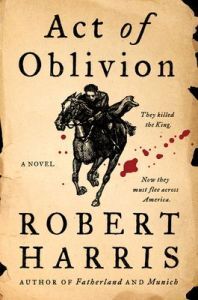
This is the best book I’ve read so far this year. Like my last non-fiction read, Alice Hunt’s Republic, I picked it up because it deals with the time period in history that I’m currently researching for my own novel. But I also knew that Robert Harris writes brilliantly readable and well-researched historical fiction, having enjoyed his Pompeii and the Cicero trilogy. Act of Oblivion did not disappoint.
The historical background for this novel is the aftermath of the English Civil War, once Charles II has been restored to the throne. While most of the people who supported Parliament in the interregnum were given amnesties when the monarchy was restored (which they pretty much had to do, because so many people switched sides back and forth in those years depending on who was in power). The exception was the men who actually signed King Charles I’s death warrant: they were condemned to death and, since most of them either fled England or went into hiding, there was an extended manhunt to find them.
Two of the regicides, committed and devout Puritans, fled to the New England colonies, believing that among Puritan settlers there they would find a safe haven. The story that unfolds in the novel is that of those two men, who are real historical characters, though Harris rounds out the little history tells us of them into two very distinct and believable men. He also invents a third character, the man relentlessly devoted to finding them for reasons that are as much personal as political. This drama from more than four centuries ago feels as vital and vivid as if it were unfolding before us in real time. I really loved this book.
Republic: Britain’s Revolutionary Decade, 1649 – 1660, by Alice Hunt
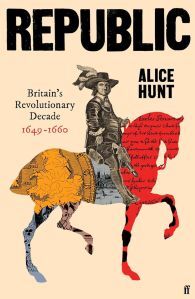
When I read books for research, I often don’t bother reviewing them here on the blog, either because I think they’re too specific to be of general interest, or because I tend to dip into and out of such books looking for relevant information and often don’t read the whole thing.
But Alice Hunt’s Republic is a book that I picked up because it deals with England in the period I’m writing about – the eleven years after the Civil War, after the execution of King Charles I, in which Britain experimented with being a parliamentary democracy without a monarch. There was no dipping into and out of this book — it’s written in a crisp, compelling style that made it easy to read straight through from beginning to end, introducing me to a wide variety of compelling characters and giving great insight into this period of English history that deserves to be better understood by the average history buff. We’re fascinated with stories about kings and queens, but let’s have more of the Republic!
February 25, 2025
Klara and the Sun, by Kazuo Ishiguro
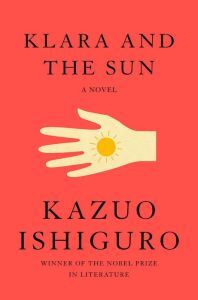
For a deep dive into this book and the conversation that inspired me to pick it up, check out my podcast conversation with George Murray, in which we discussed this novel along with a couple of others that broadly fall into the category of “literary sci-fi or fantasy” (and if you think we probably also got into some conversation about genre boundaries and why sci-fi and fantasy often aren’t considered literary, well, you have accurately assessed my interests — which is not surprising if you’re a regular here on Compulsive Overreader).
Klara and the Sun is set in a near-future world where human-looking robots are sold as AFs, or Artificial Friends, to help children with their education and socialization. Klara, the point-of-view character here, is an AF sold to a lonely young girl who appears to be suffering from some kind of illness or disability, the nature of which is not clear to Klara. We see the human characters through the eyes of Klara, who has a childlike simplicity in many ways, including her belief that the Sun is a deity that can grant strength and answer her prayers (understandable, as she is solar-powered).
I found this novel hard to put down while I was reading it. After reading and thinking about it I could identify flaws in it, especially in its pacing, but while I was in the story it absorbed me completely. Like any such story, it has a lot of interesting things to explore – about the whole “what makes us human” question (in this way it reminds me very much of Alice Hoffman’s The World that We Knew, in which the children in need are loved and cared for by a golem rather than a robot, but the questions are the same) and also the related question of what makes any life — human or otherwise — valuable vs disposable. This was an interesting book to read and reflect on.
In the Upper Country, by Kai Thomas
This novel explores a piece of history I know little to nothing about — the relationships between Indigenous and Black people (including intermarriage) during the era when slavery was legal in both countries, and in the period following when slavery was outlawed in the British empire, but bounty hunters could still pursue escaped slaves into Canada. From the experiences of Indigenous people kept in slavery in Canada, to a story that complicates our historical idea of Canada as a safe haven for enslaved Black people from the United States, this novel is a reminder that histories are always more complex and interwoven than the simplified versions we like to tell.

